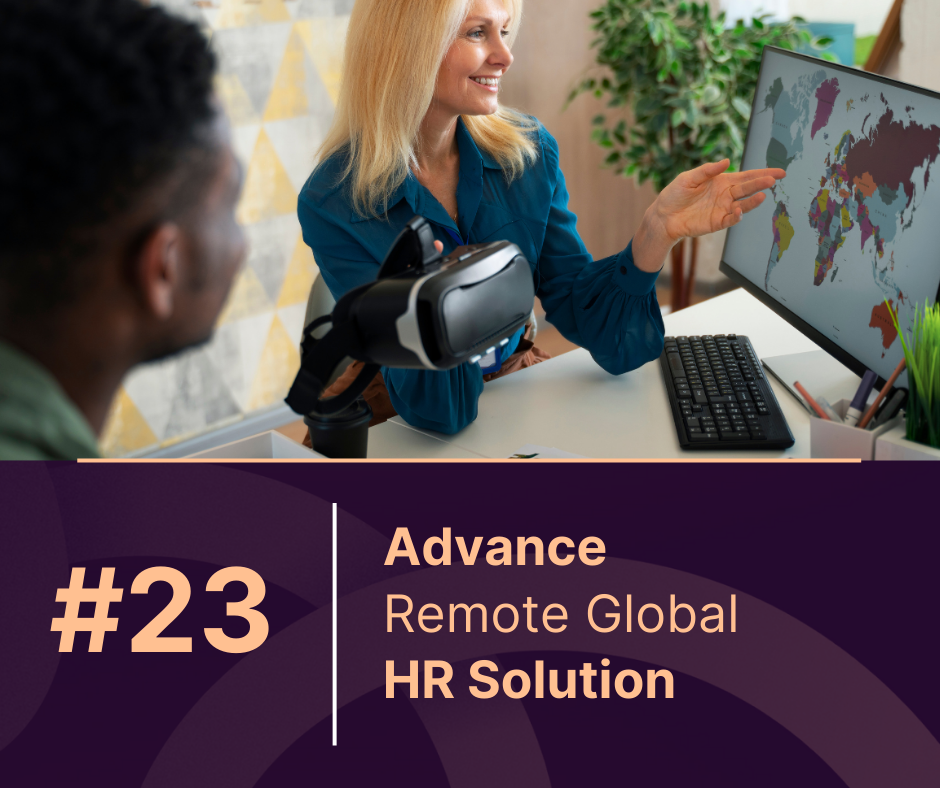In today’s fast-paced, interconnected world, businesses are increasingly turning to remote work models as part of their core operations. This shift has not only transformed how companies operate but has also reshaped the traditional human resources (HR) landscape. To succeed in this new work environment, organizations need comprehensive HR solutions that can support a diverse and geographically dispersed workforce. Enter “HR Total Solutions,” advanced tools and systems that ensure HR teams can manage and build a resilient workforce from anywhere in the world.
In this blog, we’ll explore how remote global HR solutions are pivotal in creating a resilient workforce, especially in times of uncertainty, and the features that make HR total solutions indispensable for modern businesses.
The Growing Need for Advanced HR Solutions
The pandemic accelerated the shift toward remote work, but even before that, many companies had begun experimenting with distributed teams and flexible work environments. As more companies adopted this model, they faced challenges managing employees scattered across different regions and time zones.
Advanced HR total solutions fill the gaps by providing businesses with the tools they need to efficiently manage recruitment, onboarding, payroll, compliance, and performance management for remote employees. These solutions are no longer just about automation or efficiency; they are about creating a robust HR infrastructure that can withstand disruptions and support business continuity.
Key Features of Remote Global HR Total Solutions
For HR professionals looking to build a resilient workforce, there are several essential features that modern HR solutions must offer:
1. Global Payroll and Compliance
When managing a global workforce, payroll processing and compliance can be a logistical nightmare. Different countries have unique tax laws, benefits systems, and labor regulations. HR total solutions offer global payroll functionality, ensuring that payments are accurate, timely, and compliant with local laws. This removes the burden from HR teams and reduces the risk of legal issues, fines, or penalties.
These platforms also provide real-time access to compliance information and updates, allowing HR teams to remain informed about changes in labor laws or policies in any region. This ensures businesses maintain compliance while expanding their operations to new markets.
2. Streamlined Recruitment and Onboarding
A resilient workforce starts with finding the right talent. Advanced remote HR solutions enable companies to recruit talent from around the globe, not limiting their pool to a specific geographic region. This means that businesses can source top candidates with specialized skills, regardless of where they are located.
Streamlined onboarding is another critical feature of remote HR solutions. Virtual onboarding platforms enable new hires to complete necessary paperwork, engage in training, and get acquainted with company culture—all from the comfort of their own home. This helps businesses quickly integrate new team members into the fold, reducing downtime and increasing overall productivity.
3. Remote Employee Engagement Tools
Building a resilient workforce isn’t just about hiring the right people—it’s about keeping them engaged and motivated. Remote work has been shown to improve employee satisfaction, but it also brings challenges, particularly around maintaining a strong organizational culture and collaboration.
HR total solutions come equipped with employee engagement tools like virtual team-building activities, digital feedback systems, and employee recognition programs. These tools help HR teams foster a positive work environment, boost morale, and reduce turnover, all of which are key to building a resilient workforce.
4. Performance Management and Analytics
One of the challenges of managing a remote team is tracking performance. Without the ability to see employees face-to-face, it can be difficult to gauge their productivity and performance. HR total solutions offer advanced performance management features that include real-time monitoring, goal setting, and employee feedback mechanisms.
These solutions also provide data-driven insights and analytics to help HR teams make informed decisions. By analyzing performance data, companies can identify areas for improvement, recognize high achievers, and ensure employees are meeting their goals. This transparency is essential for building a resilient, high-performing team.
5. Learning and Development Programs
To build a resilient workforce, organizations must invest in continuous learning and development (L&D) programs. Advanced HR total solutions often include learning management systems (LMS) that offer remote training and development resources. These platforms allow employees to upskill, reskill, and stay competitive in a rapidly changing business environment.
By providing access to digital learning tools, webinars, and workshops, businesses empower their employees to grow professionally, which in turn helps the company stay agile and adaptable to new challenges.
The Importance of HR Total Solutions in Fostering a Resilient Workforce
A resilient workforce is one that can adapt, innovate, and thrive in the face of change. Remote global HR solutions provide companies with the infrastructure to support employees, whether they’re working from a home office in New York or a coworking space in Tokyo.
These solutions offer flexibility and agility, allowing businesses to quickly pivot and scale their operations. They also foster a culture of inclusion, as employees from around the world can collaborate and contribute equally, breaking down geographic and cultural barriers. This diversity brings fresh perspectives and innovation to the table, which are key drivers of resilience.
Moreover, HR total solutions ensure that organizations are prepared for any eventuality, from pandemics to political unrest, by providing the systems needed to maintain productivity and morale during difficult times.
Conclusion
In conclusion, building a resilient workforce in today’s global, remote-first economy requires the right tools and strategies. Advanced remote global HR total solutions provide businesses with the flexibility, efficiency, and innovation they need to succeed in a constantly evolving landscape. By offering global payroll and compliance support, streamlined recruitment, performance management, and employee engagement tools, these solutions are critical for creating a workforce that can adapt, grow, and thrive.
As remote work becomes the new norm, investing in HR total solutions will not only future-proof your organization but also ensure that your teams are resilient, motivated, and ready to meet any challenge.
Questions:
1. Why are remote global HR solutions important for modern businesses?
Remote global HR solutions are essential for managing a geographically dispersed workforce. They provide the tools needed to handle recruitment, onboarding, payroll, compliance, and performance management efficiently. These solutions ensure that businesses can operate smoothly, maintain productivity, and build a resilient workforce despite the challenges posed by managing employees in different regions and time zones.
2. What key features should an advanced HR solution offer for remote teams?
An advanced HR solution for remote teams should include the following key features:
- Global Payroll and Compliance: Accurate payroll processing across different regions, with real-time updates on local labor laws.
- Streamlined Recruitment and Onboarding: Efficient hiring processes that allow access to global talent and seamless onboarding experiences.
- Remote Employee Engagement Tools: Features that foster a positive work environment and keep remote employees motivated.
- Performance Management and Analytics: Tools to monitor productivity, set goals, and provide feedback.
- Learning and Development Programs: Continuous learning opportunities for employees to stay competitive and upskill.
3. How do global payroll and compliance tools benefit HR teams?
Global payroll and compliance tools simplify the complex task of managing payroll across multiple countries. These tools ensure that payments are timely, accurate, and in compliance with local tax laws and labor regulations. This reduces the risk of legal issues and penalties while allowing HR teams to focus on more strategic initiatives.
4. What role does employee engagement play in building a resilient workforce?
Employee engagement is critical for building a resilient workforce. Engaged employees are more likely to stay motivated, productive, and loyal to the organization. HR solutions that offer tools for virtual team-building activities, feedback systems, and recognition programs help maintain a positive work culture, which is especially important for remote teams. This reduces turnover and enhances collaboration, both of which are key components of a resilient workforce.
5. How do performance management tools help in a remote work environment?
Performance management tools allow HR teams to monitor employee productivity and performance in real-time, even in a remote setting. These tools enable goal setting, performance tracking, and continuous feedback, ensuring that employees remain aligned with the company’s objectives. Data-driven insights help HR teams identify high performers and areas for improvement, creating a transparent and accountable work environment.
6. Why is it important for businesses to invest in Learning and Development (L&D) programs for remote employees?
Investing in Learning and Development programs helps employees stay competitive and adapt to changing business needs. L&D programs empower employees to upskill and reskill, which is crucial for maintaining a resilient workforce in a rapidly evolving business landscape. Continuous learning opportunities also keep employees engaged and motivated, contributing to their personal and professional growth.
7. How do remote HR solutions foster diversity and inclusion in the workplace?
Remote HR solutions break down geographic and cultural barriers by allowing companies to hire talent from anywhere in the world. This creates a more diverse workforce that brings fresh perspectives and innovation. These solutions also promote inclusion by providing equal access to resources and tools, enabling employees from different regions to collaborate and contribute to the organization’s success. This diversity and inclusivity are key drivers of resilience and long-term business success.



